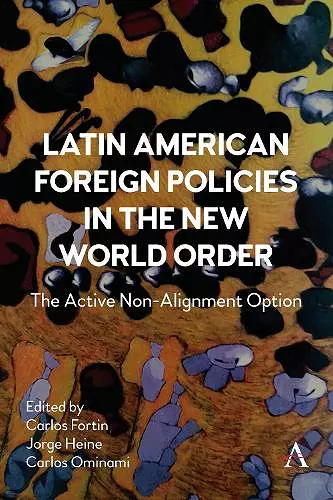Latin American Foreign Policies in the New World Order
The Active Non-Alignment Option
Jorge Heine editor Carlos Fortin editor Carlos Ominami editor
Format:Hardback
Publisher:Anthem Press
Published:7th Feb '23
Should be back in stock very soon
This hardback is available in another edition too:
- Paperback£25.00(9781839991035)

Argues that Active Non-Alignment is the path to follow if Latin America is to realize its full potential and occupy its rightful place in the concert of nations.
At a time of growing US-China tensions, and of Latin America’s deepest crisis in a century, Active Non-Alignment option embodies a novel way out of this predicament.
Latin America, with 8 percent of the world’s population and 30 percent of the world’s deaths from COVID-19, is Ground Zero of the pandemic. The region has also had the world’s worst economic performance in this period. Moreover, it is presently caught in the Second Cold War that is emerging between the United States and China. In this context, the active non-alignment option constitutes an imaginative and creative way out of the current crisis.
Interview on Active Non-Alignment Book on Polaris Live
Book Launch at OAS
This important, thought-provoking contribution by leading Latin American scholars and diplomats laments that Latin America has become increasingly marginalized, losing market shares and diplomatic clout. - Foreign Affairs
Latin American foreign policies in the new world order: The non-alignment option marks an important intervention in this debate, bringing together an impressive line-up of former policymakers and academic experts […] The volume will be essential reading for anyone interested in Latin America’s place in a changing world. Numerous chapters excel on their own. - European Review of Latin American and Caribbean Studies
The book explores – and largely advocates – ANA as a policy option for nearly three dozen countries across the heterogeneous region of Latin America and the Caribbean. […] The book’s diverse assessments of the increasingly prominent ANA framework make it important reading for those trying to understand where Latin America will position itself in a changing world. —Global Policy
“Latin American Foreign Policies in the New World Order: The Active Non-Alignment Option is a must-read for policymakers and scholars aiming for Latin American and other once-peripheral nations to exercise effective agency in a world of changing core powers and modes of competition. The scholar-practitioner contributors to this volume present strategies for lesser powers to maintain equidistance from great powers, to pursue their own agendas, and to help prevent a ‘New Cold War” — Louis W. Goodman, Dean Emeritus, School of International Service, American University, Washington DC.
“The world today is witnessing intensified great power competition, especially between the United States and China. Yet, most of the global south rejects taking sides in the rivalry, viewing it as a grave threat to peace and stability. Reviving but significantly updating the idea of non-alignment, this book charts a timely, fascinating, and realistic approach to the ‘return of geopolitics’ that would be of great interest to scholars, policymakers and media trying to make sense of the future of world order” — AmitavAcharya, Distinguished Professor, School of International Service, American University, and past president, International Studies Association (ISA).
The edited book Latin American Foreign Policies in the New World Order: The Active Non-Alignment Option by Carlos Fortin, Jorge Heine and Carlos Ominami, and published by Anthem Press is an enthralling and transformed perspective on theoretical foundations of non-alignment within the changed dynamics of international relations. The value of the book is that it is not utopian but based on empirical evidences, a fact that readers would appreciate. - International Studies
“As established norms and expectations, relationships at every level, and both community and communications are challenged around the world, three outstanding Chilean scholars and practitioners of international relations have assembled a highly qualified international symposium on how to understand and respond to a world in flux. Focused on how Latin American countries should respond, this book is highly recommended for those who want to be ready for global change in Africa, Europe, West, East, and South Asia, and throughout the Americas, North and South. The book is insightful, constructive, and likely influential”— Abraham F. Lowenthal, Professor Emeritus of International Relations, University of Southern California.
“The work of defining and defending Latin American countries’ own interests amid a fierce contest between geopolitical giants elsewhere gains clarity and energy from the sophisticated economic analysis, historical perspective, and firsthand insights found in this volume. It’s an essential contribution to one of the biggest questions facing Latin American foreign policies today”— Catherine Osborn, columnist, Foreign Policy Magazine.
Active non-alignment has many controversial angles, not least going against the current request of weapons to Ukraine. It also pushes Latin American countries to face the challenge of competing in the strategic framework of integration — Mariano Aguirre, Associate Fellow, International Security Programme; Chatham House .
In the book Latin American Foreign Policies in the New World Order, Carlos Fortin, Jorge Heine, and Carlos Ominami have compiled learned contributions from eminent Latin American personalities to give us this well-researched, reviewed, and redacted compendium on the central theme of active non-alignment (ANA). This is a seminal work that articulates the basis of much of the region's modern foreign policy. It is as timely, as it is relevant —Deepak Bhojwani, The Wire
The book seeks to bridge the gap between policy-making and academia, bringing together a mix of former prominent policy-makers and diplomats, as well as renowned scholars. - International Affairs
ISBN: 9781839985720
Dimensions: 229mm x 153mm x 26mm
Weight: 454g
310 pages